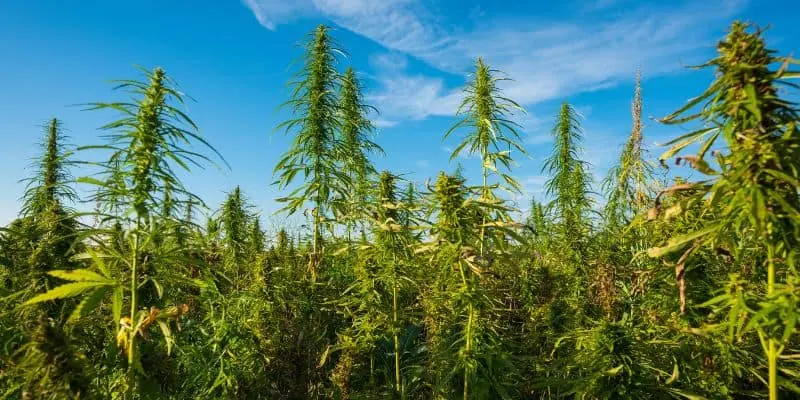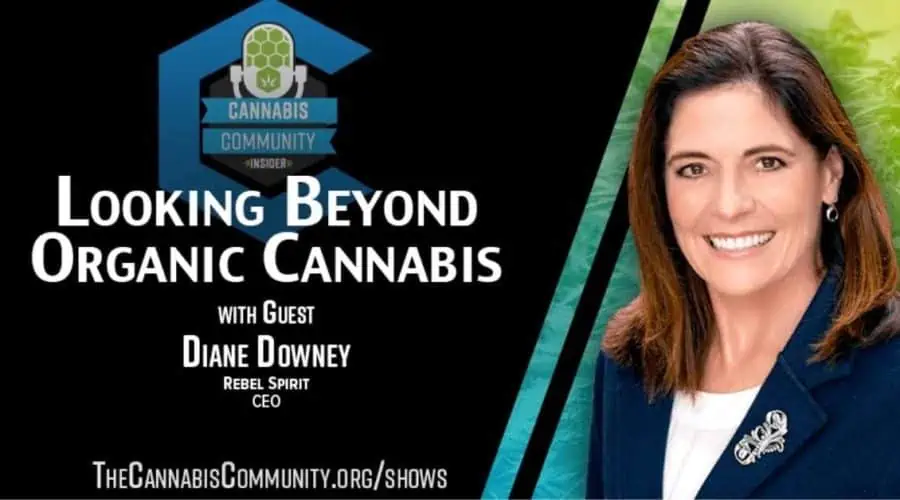Looking Beyond Organic Cannabis: The Rebel Spirit Way
Welcome to this new episode of The Cannabis Community Insider. Our host, Penelope Hamilton looks beyond traditional cannabis cultivation with special guest Diane Downey. Diane is the CEO of Rebel Spirit Cannabis, one of Oregon’s most highly respected organic cannabis brands.

In 2015, Diane teamed up with partner Chris Bechler to create Rebel Spirit, but with a special vision. During the 1990s, Uncle Mark, a family friend, was wrongfully imprisoned for growing cannabis. Sadly Mark died in prison, but his rebel spirit lives on in the ethics of the farm, its family of employees, their integrity, and even in the close detail of the company branding and packaging.
Highlights from this episode:
Table of Contents
Introduction (0:03)
- The episode is about organic and sustainable farming practices within the cannabis industry.
- Diane Downey, the guest for the episode, is introduced. She co-founded Rebel Spirit Cannabis Farms with her partner, Chris Beckler, in 2015 in Eugene, Oregon.
Diane’s background and Rebel Spirit (0:22)
- Diane had a background in teaching, but her husband’s construction business was no longer satisfying.
- When Oregon legalized recreational marijuana, they mortgaged their house and bought a farm to start a cannabis business.
- “Rebel Spirit” comes from a family friend named Uncle Mark who died in prison after being convicted of growing marijuana in the 1990s. The farm’s name is a tribute to him.
- Rebel Spirit Cannabis Farms is also involved with the Last Prisoner Project. This non-profit organization aims to release and support incarcerated people for non-violent cannabis offenses.
Choosing organic farming (1:97)
- Rebel Spirit chose to farm organically because it aligns with their environmental sustainability and integrity values.
- Organic farming ensures that the product is pure and safe for consumers.
- Rebel Spirit uses all-natural citrus oils and other natural methods to control pests and avoid using pesticides.
- The farm’s soil is living and healthy, which benefits the environment and produces healthier plants.
- Chemical fertilizers and pesticides strip the soil of nutrients and ultimately create dead soil contributing to environmental degradation.
Challenges of organic cannabis farming (4:56)
- Organic farming is more expensive than conventional farming.
- Chemical fertilizers and pesticides are less expensive and result in larger yields, so many farmers choose to use them.
- Rebel Spirit has to rely on consumers who share their values and are willing to pay more for organic products.
A holistic approach to farming (5:40)
- Rebel Spirit’s holistic approach to farming involves creating a diverse ecosystem on their farm.
- They have bugs, frogs, snakes, and other animals living on their farm, which contribute to biodiversity.
- They also have chickens and turkeys and an organic vegetable garden, which provides food for their employees.
- Rebel Spirit’s approach to farming is ethical, environmentally sustainable, and holistic.
Sustainability in Growing Practices 08:21
- Rebel Spirit is committed to sustainability in their growing practices.
- They grow using organic nutrients and mainly grow in greenhouses and outdoor spaces.
- Growing in greenhouses and outdoors allows Rebel Spirit to use sunshine and wind as natural resources, reducing their carbon footprint.
- Rebel Spirit uses fans to keep the air moving in the greenhouses, and they have one harvest a year with outdoor grow, and two to three harvests a year with greenhouses.
- Rebel Spirit’s commitment to sustainability is worth the energy savings.
Terpenes and Soil 13:21
- Terpenes are essential oils that give plants their unique flavors and aromas.
- All plants have terpenes, and they get them from soil.
- Living soil creates a richer-tasting plant.
- Rebel Spirit values the natural taste of their organic cannabis, and they grow cannabis in Oregon and California to emphasize the unique taste of the soil in those locations.
Certification Agencies for Organic Growing Practices 15:36
- Outside certification agencies will certify farms as growing organic for a fee.
- Rebel Spirit does not have these certifications but grows using organic practices.
- These certifications are an added cost for farms.
Indoor Growing vs. Outdoor Growing 11:03
- Rebel Spirit mainly grows in greenhouses and outdoor spaces.
- Indoor growing requires electricity, often from coal-powered plants and contributes to the carbon footprint.
- Indoor growing also requires temperature control systems and ventilation, which are energy suckers.
- Outdoor growing uses natural resources like sunshine and wind, reducing the carbon footprint.
- Rebel Spirit values sustainability and prefers to grow in greenhouses and outdoor spaces.
Uniformity vs. Natural Taste 14:15
- Rebel Spirit is a craft organic cannabis grower and values the natural taste of their cannabis.
- Uniformity in cannabis can lead to a more processed and artificial product.
- Rebel Spirit’s strains have unique tastes depending on where they are grown and the soil they are grown in.
- Outside certification agencies will certify farms as growing organic for a fee.
- Rebel Spirit does not have these certifications for organic cannabis but grows using organic practices.
- These certifications are an added cost for farms.
Organic Cannabis Certification 16:05
- The USDA organic stamp is a certification that many growers in the cannabis industry are looking forward to.
- However, by law, organic cannabis companies cannot label their products as organic.
- Instead, they use the term “all natural,” which means organic for some companies in the industry.
- Rebel Spirit’s products are all natural and organic.
Terpenes and Full-Spectrum Products 16:31
- Terpenes and the full profile of plants play a crucial role in the quality of cannabis products.
- Rebel Spirit believes in providing a quality full-spectrum product, not just isolates and distillates.
- Many medical patients prefer a stable product to dose accurately, but others want a full profile for a better experience.
Natural vs. Artificial 16:42
- The cannabis industry is evolving, and there will be customers who prefer natural products and others who prefer consistency.
- Organic products are not much more expensive for Oregon consumers, and many Oregon grow organically.
- Rebel Spirit uses biodegradable and recyclable packaging to ensure sustainability.
- The company tries to stay as close to natural as possible, with natural packaging and cellophane, which is biodegradable.
Sustainability Issues 19:18
- Sustainability is a challenge for the organic cannabis industry, and Rebel Spirit is addressing this issue.
- The company uses biodegradable and recyclable packaging to ensure sustainability.
- Environmental waste concerns the industry, and Rebel Spirit’s products are as close to natural as possible.
- The company doesn’t sell vape cartridges because of the environmental waste they produce and the risks associated with impurities.
- Rebel Spirit tries to stay as close to natural as possible in every way.
Soil Preparation 23:10
- Soil preparation is very important in growing organic cannabis.
- Rebel Spirit Cannabis makes its own soil, instead of buying it from somewhere.
- They buy organic compost and perlite in bulk and mix it with the soil from their farm.
- They have a huge soil mixer where they mix all the ingredients together.
- Mixing the soil is a year-round process.
- They have their own worm farm, and worm castings are added to the soil.
- The compost is left to cook down all winter and is ready to use next spring.
- The soil is mixed with organic teas and nutrients.
- They use organic bat guano as a fertilizer.
- Making their own soil saves them money and gives them better control over what goes into it.
Farming Practices 23:53
- Rebel Spirit Cannabis is located in an alluvial plain with super rich soil.
- The soil tends to pack down, so they add fiber to it.
- They harvest the stalks of the organic cannabis plants and run them through a wood chipper.
- The chipped stalks are added to the compost pile.
- The compost is left to cook down all winter.
- They use the compost to add nutrients to the soil.
- They use organic bat guano as a fertilizer.
- They focus on sustainability and environmental responsibility in their farming practices.
Certification 27:15
- Buying organic soil is expensive.
- Without certification, it’s hard to know if it’s truly organic.
- Making their own soil gives them better control over what goes into it and saves them money.
- They use organic practices to grow their cannabis.
Did you enjoy this episode? Watch more shows!


